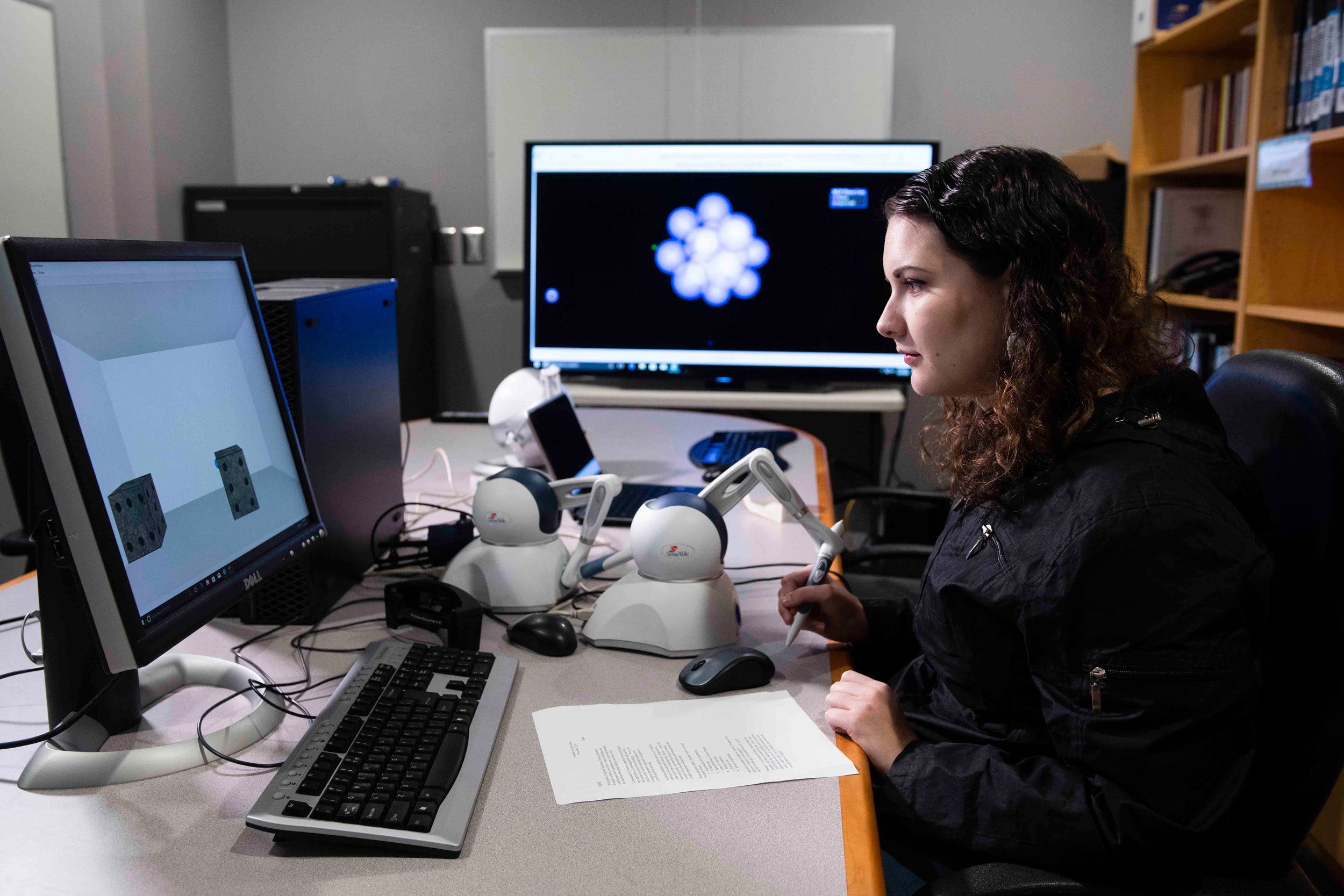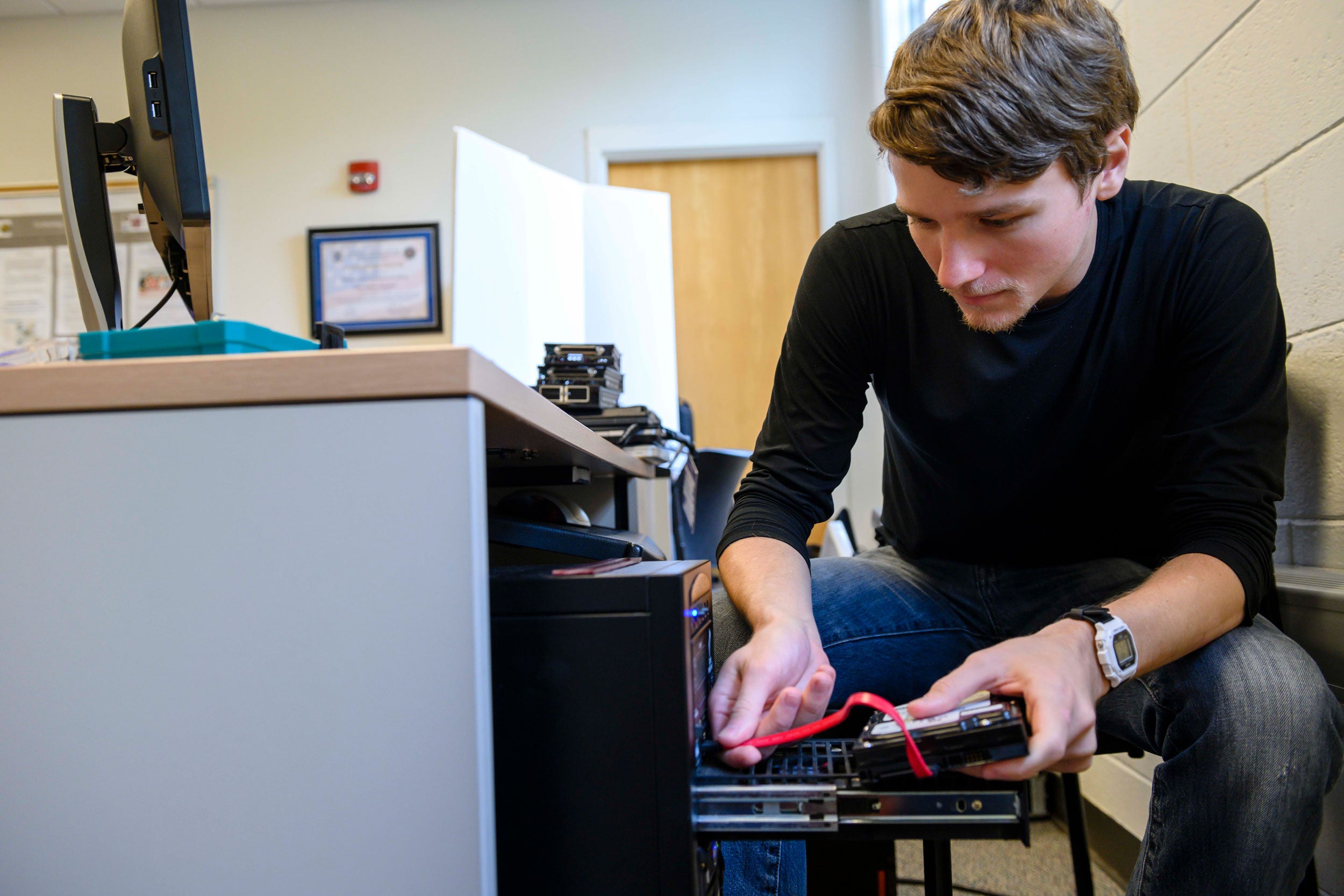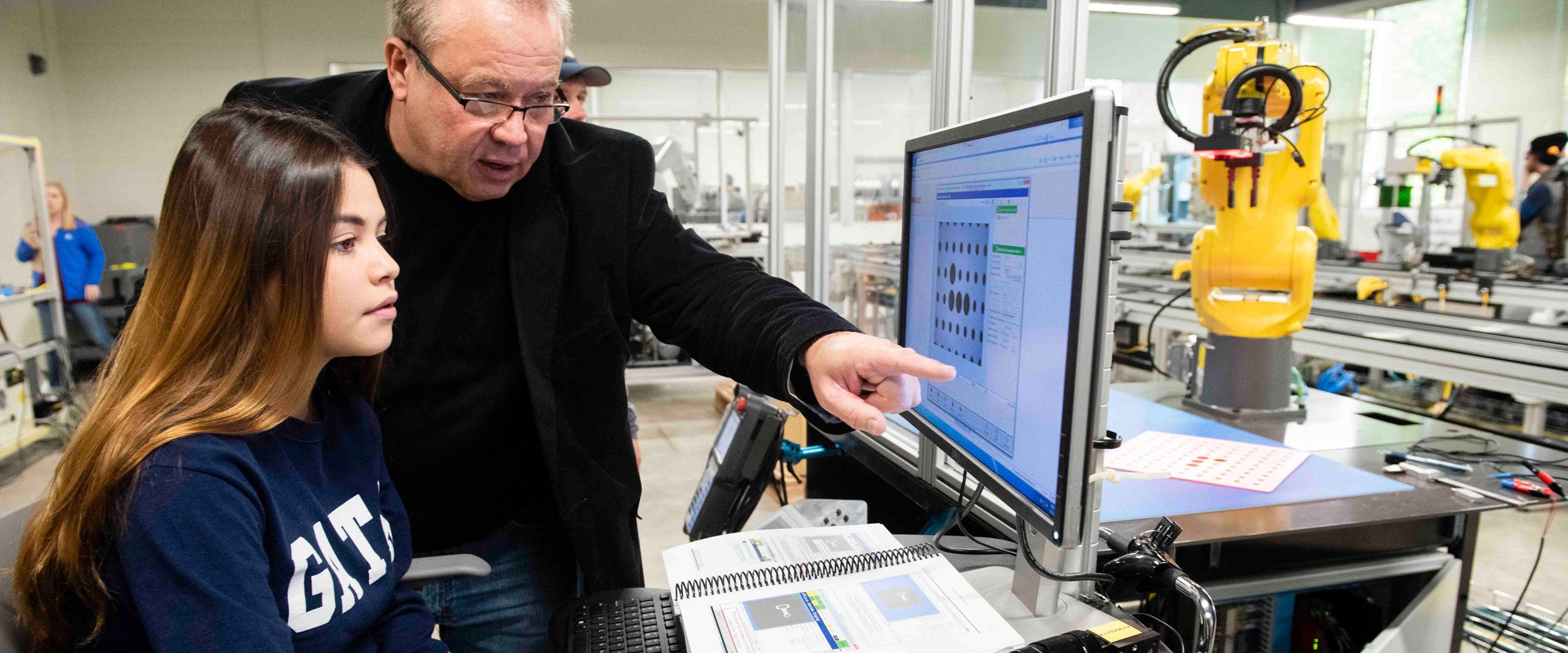Computer engineers lead the way to society-shaping technologies — and Georgia Southern University can show you how to get there.
Locations
- Statesboro Campus (In Person)
- Armstrong Campus (In Person, First Two Years Only)
Why Major in Computer Engineering at Georgia Southern?
- Earn top dollar: Computer engineers are among the best paid in the field.
- Study in a program accredited by the Engineering Accreditation Commission of ABET, https://www.abet.org.
- Engage in a program that emphasizes hands-on learning experiences, allowing undergraduates to apply classroom knowledge in real-world settings and participate in faculty members’ cutting-edge research.
- Develop the academic and professional skills essential for excelling in graduate programs, or for entering the workforce with confidence.
- 130 credit hours to completion.
Computer engineering is at the forefront of driving technological advancements that shape the future, applying its principles toward the development of hardware, software and networks. If you picture yourself pioneering these possibilities, Georgia Southern’s Bachelor of Science (BS) in Computer Engineering program gives you the skills needed to design the components and programs used for everything from mobile devices to networking equipment.
As a computer engineering major, you’ll explore engineering principles, as well as analysis and design skills. Then, you’ll have opportunities to go into the lab and out into the field to put theory into practice and build your résumé. Throughout, you’ll learn from research-intensive faculty who prepare you to drive society through your ideas.
Ready to Apply?
What Can You Do With a Bachelor’s in Computer Engineering?
Computer engineers are in demand — and so are Georgia Southern’s alums, who are employed by aerospace companies, the government and military, networking equipment manufacturers and more.
Where our graduates work:
- Robins Air Force Base
- Amazon Web Services (AWS)
- risk3sixty
- Savannah River Nuclear Solutions
- Georgia-Pacific
- Georgia Power
- Gulfstream Aerospace
- Lockheed Martin
- Southern Nuclear
- Raytheon
- NXP Semiconductor
- Hyundai Motor Group Metaplant America (HMGMA)
- L3Harris
What our graduates do:
- Applications developer
- ASIC design engineer
- Embedded systems engineer
- Firmware engineer
- Hardware engineer
- Network engineer
- Programmer analyst
- Software engineer
- Robotics engineer
- Cybersecurity engineer
What You’ll Learn
To understand where physical design, programs and code intersect, students delve into analog and digital circuits, computer architecture, robotics, software engineering and more. Coursework is divided between traditional electrical engineering principles and computer science competencies.
From here, a deep selection of technical electives allows you to focus on specific computer engineering applications. Topics include data mining, game programming, networking and cybersecurity, among others.
Putting your knowledge into action, you’ll work on a team capstone design project that involves identifying a problem, researching solutions and executing development.
See the CurriculumBuild Your Experience
Computer engineering majors put their curiosity to work long before they graduate. Made-for-you experiences let you get a taste of this career while you’re still a student.
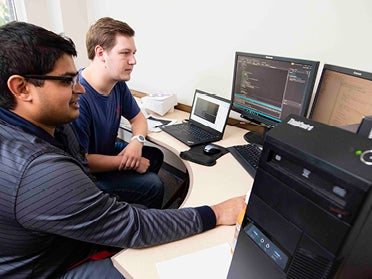
Co-Op/Professional Experience
Earn money while building on-the-job skills through an off-campus co-op experience. Spend up to three semesters putting your knowledge to work in a full-time position.
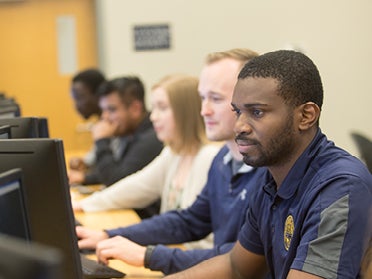
Directed Study/Research
Go beyond the syllabus with a directed study project. Work closely with a faculty member to design your own research and applications focused on computer engineering.
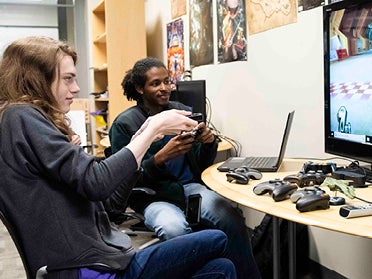
Get Involved
Join student chapters of groups including the Institute of Electrical and Electronics Engineers, the National Society of Black Engineers, the Society of Hispanic Professional Engineers, Tau Beta Pi and the Society of Women Engineers to build your network (the person-to-person kind).
Want to Learn More?
Explore essential information about our BS in Computer Engineering program, including application details, accreditation status, and licensing disclosures. Gain insight into the program’s credibility and requirements to help you start your journey toward success with the knowledge you need.
Follow these steps to complete the Georgia Southern application:
- Create an application account.
- Complete our online application using the PIN you received after creating your application account.
- Once complete, pay the $30 application fee or upload a valid fee waiver. Previous Georgia Southern applicants and dual enrollment students do not need to pay the fee.
You can check your application status at My.GeorgiaSouthern.edu/admissions three days after completing your application. This page contains live information about your admission status, including a checklist of missing documents we need to make a decision.
Apply as a First-Year Student Transfer to Georgia SouthernCredits for core courses are transferable across all schools within the University System of Georgia.
Students who transfer fewer than 30 semester credit hours must take the University Orientation course (FYE 1220), which is unique to Georgia Southern.
All students must complete the University Core Capstone course (CORE 2000). The prerequisite for this one-hour required course is 36 earned credit hours, including three hours from the Institutional Priority area.
Any major-specific requirements will be evaluated by the Office of Admissions and/or the major department. Appropriate credits will be assigned.
Students who transfer from outside of the University System of Georgia will be evaluated by the Office of Admissions and/or the major department, and the appropriate transfer credits will be assigned.
Georgia Southern’s computer engineering program is accredited by the Engineering Accreditation Commission of ABET, https://www.abet.org, under the commission’s General Criteria and Program Criteria for Computer Engineering Programs.
Program Educational Objectives
The computer engineering program at Georgia Southern will enable you to accomplish the following.
- Be successfully employed in the computer engineering field or pursue relevant graduate degrees such as in engineering, business or science.
- Be proficient in the design and implementation of computer systems using modern tools and proper documentation and testing procedures.
- Draw upon a broad base of knowledge in science and engineering to provide viable solutions within the appropriate technological, global, societal, ethical and organizational context.
- Expand your capabilities and knowledge of contemporary issues through continuing education or other lifelong learning experiences, including advanced training or licensing.
- Effectively communicate and work in cross-functional teams while conducting yourself with high standards of ethics and professional responsibility.
Student Outcomes
The following are the student outcomes (SOs) and skills that you are expected to possess upon graduation.
An ability to acquire and apply new knowledge as needed, using appropriate learning strategies.
An ability to identify, formulate and solve complex engineering problems by applying the principles of engineering, science and mathematics.
An ability to apply engineering design to produce solutions that meet specified needs with consideration of public health, safety and welfare, as well as global, cultural, social, environmental and economic factors.
An ability to communicate effectively with a range of audiences.
An ability to recognize ethical and professional responsibilities in engineering situations and make informed judgments, which must consider the impact of engineering solutions in global, economic, environmental and societal contexts.
An ability to function effectively on a team whose members together provide leadership, create a collaborative and inclusive environment, establish goals, plan tasks and meet objectives.
An ability to develop and conduct appropriate experimentation, analyze and interpret data, and use engineering judgment to draw conclusions.
Licensure in engineering falls under the authority of state licensing boards. The computer engineering program results in a student earning “an ABET-accredited degree,” which is one of the requirements for the Professional Engineer (PE) license in all states. Other requirements include passing the Fundamentals of Engineering (FE) examination, passing the Principles and Practice of Engineering (PE) examination, and engineering work experience.
If you intend to pursue professional licensing, which we recommend, we advise you to contact the state licensing board (https://ncees.org/state-links/) in the state(s) where you want to become licensed to familiarize yourself with their specific requirements. Information for licensing in Georgia is available at https://sos.ga.gov/licensing-division-georgia-secretary-states-office.
Faculty Feature
Conservation starts at home. Through a project Prof. Rami Haddad led with a Georgia Southern graduate student, high schoolers were given access to smart-home technology to monitor their energy use and dial it back when possible.
Meet Our Computer Engineering Faculty
Related Programs
Accreditation
The Bachelor of Science in Computer Engineering program is accredited by the Engineering Accreditation Commission of ABET, https://www.abet.org, under the commission’s General Criteria and Program Criteria for Computer and Similarly Named Engineering Programs.

Take the Next Step
Bring tomorrow’s technology to life with a BS in Computer Engineering from Georgia Southern. Learn more about our innovation-driven program today.
Contact Us:
Electrical and Computer Engineering
Georgia Southern University
P.O. Box 8045, Statesboro, GA 30460
Phone: 912-478-5373
Fax: 912-478-0537
eeng@georgiasouthern.edu
Program Contact Information
Dr. Rami Haddad
Professor and Chair
Department of Electrical and Computer Engineering
Phone: 912-478-0006
Email: rhaddad@georgiasouthern.edu

